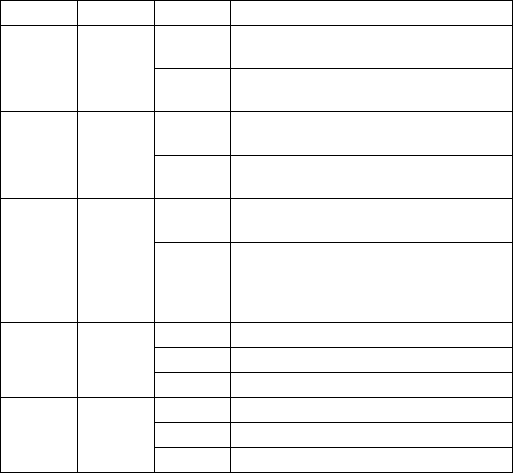
— 9 —
LED Indicators
The front panel of the NI Switch contains several LED indicators. The function
of each LED is described in the table below.
LED Color State Description
On
Power is being supplied to power input
PWR1
PWR1
AMBER
Off
Power is not being supplied to power
input PWR1
On
Power is being supplied to power input
PWR2
PWR2
AMBER
Off
Power is not being supplied to power
input PWR2
On
When the corresponding PORT alarm is
enabled, and the port’s link is inactive.
FAULT
RED
Off
When the corresponding PORT alarm is
enabled and the port’s link is active, or
when the corresponding PORT alarm is
disabled.
On TP port’s 10 Mbps link is active
Blinking Data is being transmitted at 10 Mbps
10M
GREEN
Off TP Port’s 10 Mbps link is inactive
On TP port’s 100 Mbps link is active
Blinking Data is being transmitted at 100 Mbps
100M
GREEN
Off TP Port’s 100 Mbps link is inactive
Auto MDI/MDI-X Connection
The Auto MDI/MDI-X function allows users to connect the NI UES-3880’s
10/100BaseTX ports to any kind of Ethernet device, without needing to pay
attention to the type of Ethernet cable being used for the connection. This
means that you can use either a straight-through cable or cross-over cable to
connect the NI UES-3880 to Ethernet devices.
Dual Speed Functionality and
Switching
The NI UES-3880’s 10/100 Mbps switched RJ45 port auto-negotiates with the
connected device for the fastest data transmission rate supported by both
devices. The NI UES-3880 is a plug-and-play devices, so that software
configuration is not required at installation, or during maintenance. The
half/full duplex mode for the switched RJ45 ports is user dependent and
changes (by auto-negotiation) to full or half duplex, depending on which
transmission speed is supported by the attached device.
Switching, Filtering, and Forwarding
Each time a packet arrives at one of the switched ports, a decision is made to
either filter or forward the packet. Packets with source and destination
addresses belonging to the same port segment will be filtered, constraining
those packets to one port, and relieving the rest of the network from the need to
process them. A packet with destination address on another port segment will
be forwarded to the appropriate port, and will not be sent to the other ports
















